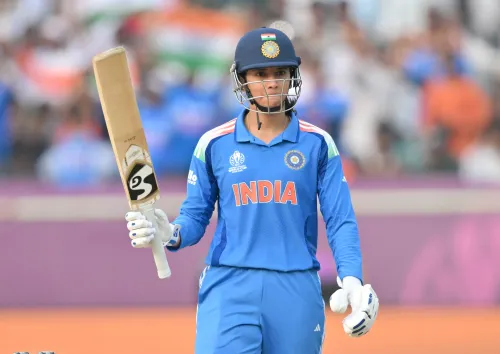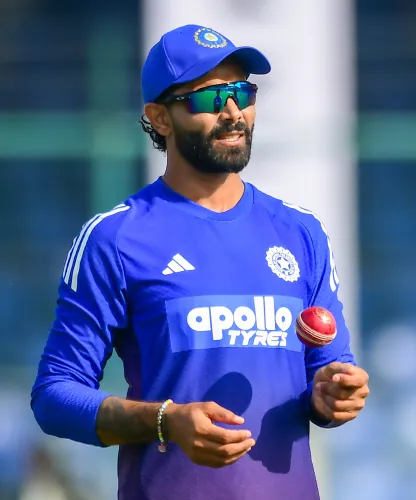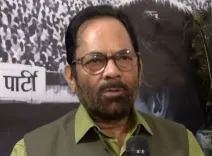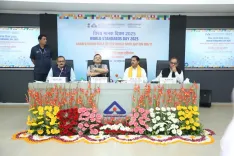Can the New Delhi Test Propel West Indies' Test Cricket Aspirations?

Synopsis
Key Takeaways
- Team Resilience: The West Indies displayed notable perseverance despite the loss.
- Performance Improvement: Chase emphasized the need for better batting consistency.
- Future Potential: The match could serve as a foundation for future success.
- Standout Players: Centuries from Campbell and Hope showcased batting strength.
- Adaptation: Learning to adapt to different pitches is crucial for success.
New Delhi, Oct 14 (NationPress) West Indies’ skipper Roston Chase is optimistic that his team's determined display in the second Test against India could signify the onset of a more competitive era for the Caribbean unit in red-ball cricket. On Tuesday, at the Arun Jaitley Stadium, West Indies faced a seven-wicket loss, concluding the series with a score of 2-0 against India.
Even in defeat, Chase praised the resilience shown by his players with the bat, especially as they batted for nearly 200 overs and produced two centuries from John Campbell and Shai Hope. The West Indies scored 248 runs in their first innings, but the second innings showcased a significant improvement with 390 runs made in approximately 119 overs.
"This is the kind of fight that I wanted to see from us in earlier matches. I believe this is a stepping stone, a foundational step for us to progress and enhance our status as a Test-playing nation. This performance will instill confidence and bolster our belief that we can compete against established Test-playing nations," remarked Chase during the post-match press conference.
The New Delhi match provided a rare glimpse of the West Indies batting unit's resilience, which has faced criticism in recent months, particularly after being skittled out for 27 runs against Australia at home. While the scorecard suggested advancement, the playing conditions were notably favorable.
India's recent shift from spin-friendly pitches to more traditional flat surfaces allowed the batters to settle and gain valuable batting time. The centuries by Campbell and Hope, along with Justin Greaves’ unbeaten 50 and the lower-order resistance, came on a slow, low Delhi pitch that offered minimal assistance to bowlers.
Chase emphasized the necessity of adapting to conditions and maintaining basic disciplines over extended periods, particularly as the West Indies are set to embark on their tour of New Zealand.
"Our main area for improvement lies in our batting. That has let us down in the last two series. We possess a strong bowling attack, despite a few injuries. If we can establish solid first-innings totals, we'll be in a better position to fight for victories in the Test championship," said Chase.
"We discussed that this first year in the cycle was always going to be challenging against teams like Australia, India, and now New Zealand. However, if we can learn from these experiences and carry those lessons into next year—when we face teams like Sri Lanka and Pakistan, who are closer to us in rankings—we can enhance our competitiveness against them," he added.
Chase also expressed support for Greaves, indicating his potential for a larger role in the future. "In fact, had we batted first, he would have been at number six. I believe his batting skills surpass his bowling capabilities. He’s adept at playing both spin and pace, making him a prospect for the future."
While Chase refrained from commenting on board-level decisions regarding A tours, he underscored the necessity for more exposure to spin-friendly conditions, referencing a training trip some West Indies players took at the Chennai Super Kings high-performance academy.
"It would be beneficial if our board could organize such opportunities. We understand the challenges in putting everything in place, so we must work with what we have. However, it’s advantageous for our players to gain more exposure to spin, as we seem more comfortable facing fast bowling than quality spin bowling. Regular practice against spin would greatly benefit our cricket," he noted.
He also believes that extended opportunities for players will aid their transition to the international cricket arena. "It would be fantastic if we could provide some players with a longer run to learn on the job. Many of our players enter international cricket after playing only 15-20 first-class games, while their counterparts in other teams often have 80-100. For us, it’s about learning on the job. If a player can have an extended run to adjust and understand what it takes to improve and maintain consistency at this level, it would be beneficial."
Reflecting on the team’s ambiance, Chase remarked that they need to rediscover their joy in playing together. "The fight we exhibited in this last game will give us the belief and confidence to know we can perform at this level. We must consistently work hard, believe in ourselves, and function as a cohesive unit," he stated.
Chase concluded by acknowledging that despite the ups and downs of West Indies cricket teams, the sport remains the preferred choice in the Caribbean. "Cricket holds a special place in the Caribbean. It's the number one sport, as there aren’t many other sports that can provide for families. Many youngsters gravitate towards cricket because it’s the one avenue where they see people on TV earning a living. So yes, cricket is still cherished and pursued in the Caribbean," he affirmed.









